牛津译林版(2019)必修第二册Unit 3 Festivals and customs Grammar and usage 课件(共18张PPT)
文档属性
| 名称 | 牛津译林版(2019)必修第二册Unit 3 Festivals and customs Grammar and usage 课件(共18张PPT) | 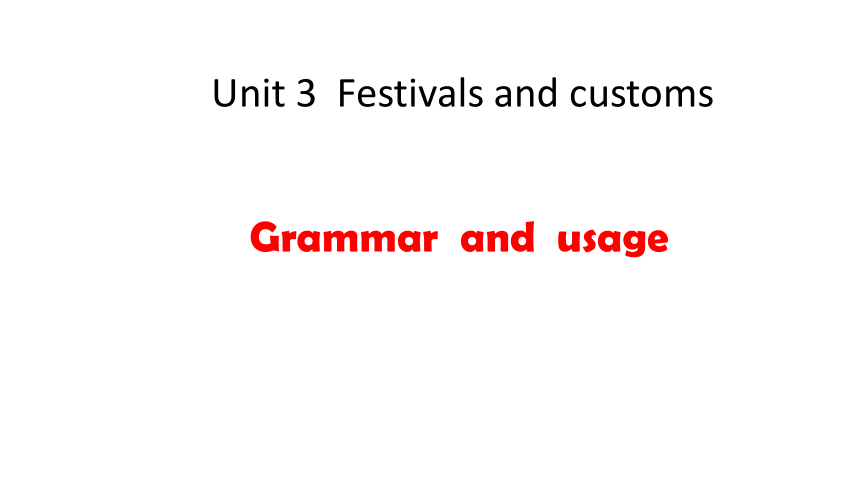 | |
| 格式 | pptx | ||
| 文件大小 | 786.2KB | ||
| 资源类型 | 教案 | ||
| 版本资源 | 牛津译林版(2019) | ||
| 科目 | 英语 | ||
| 更新时间 | 2024-02-29 17:51:48 | ||
图片预览

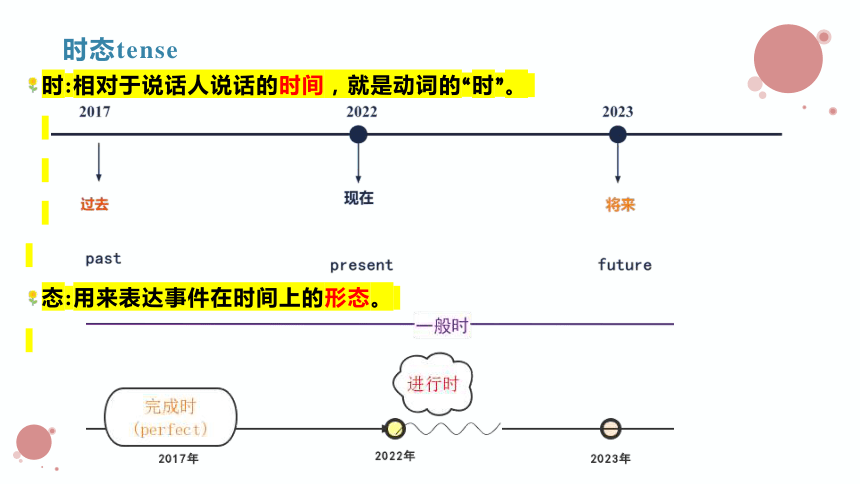
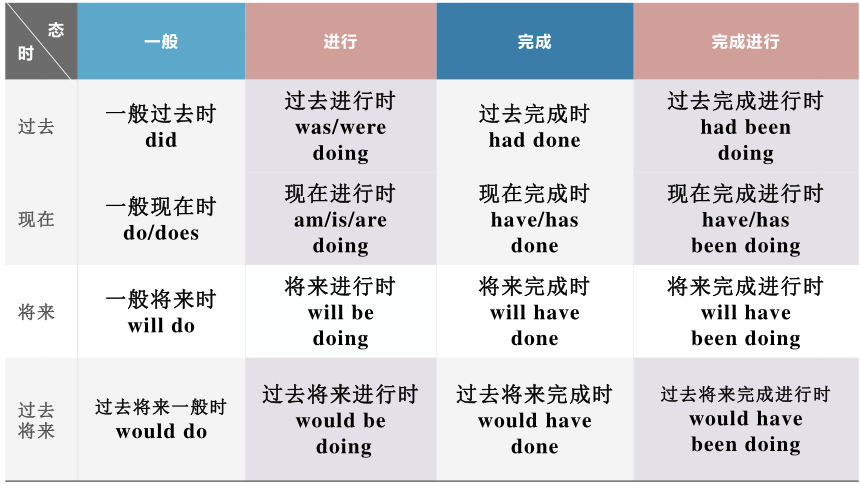
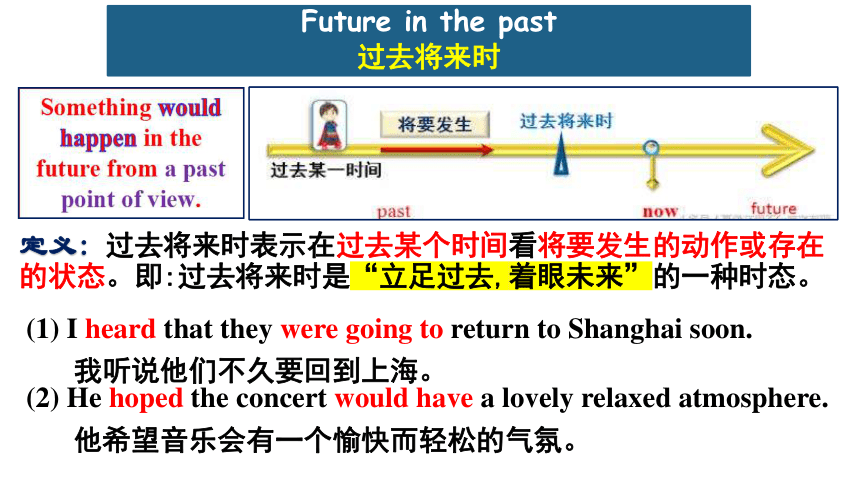
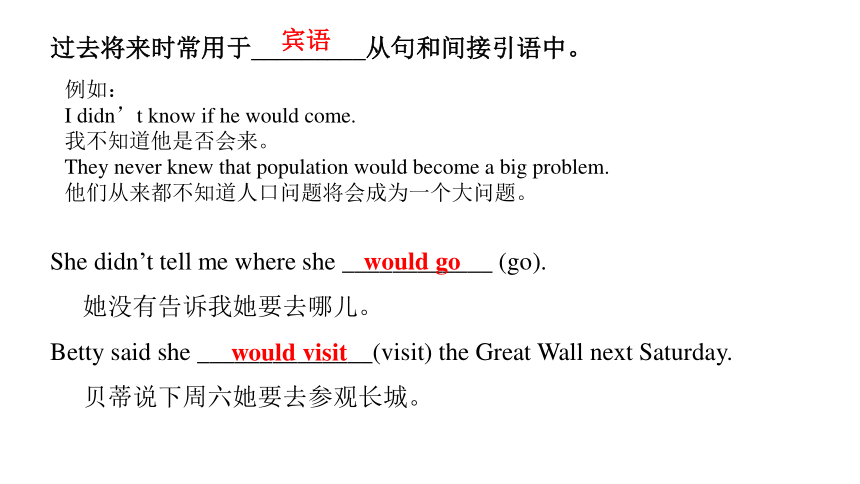
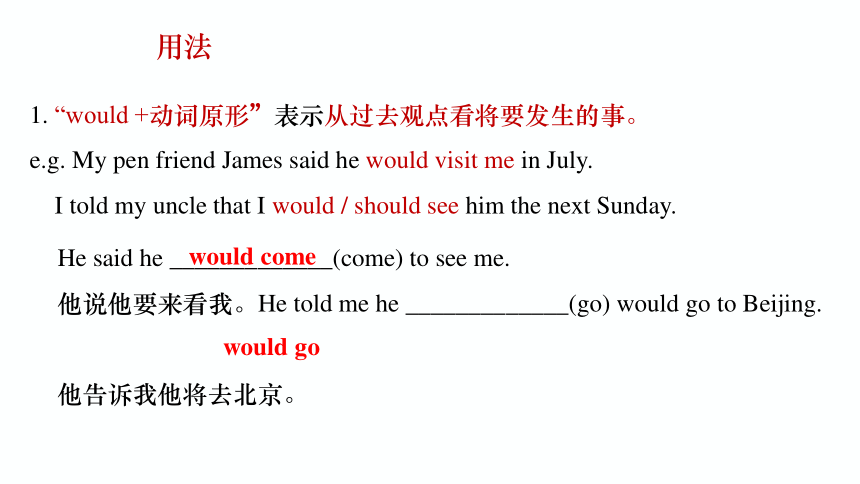
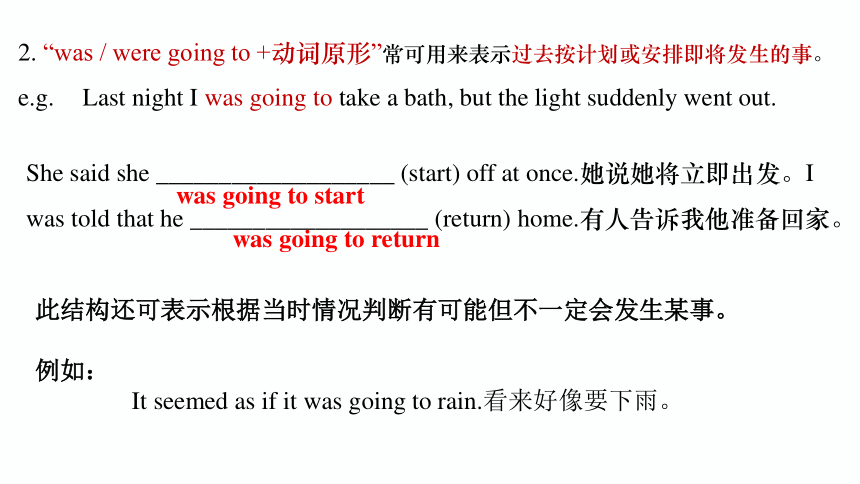
文档简介
(共18张PPT)
Grammar and usage
Unit 3 Festivals and customs
时态tense
时:相对于说话人说话的时间,就是动词的“时”。
态:用来表达事件在时间上的形态。
态 时 一般 进行 完成 完成进行
过去 一般过去时 did 过去进行时 was/were doing 过去完成时 had done 过去完成进行时
had been
doing
现在 一般现在时 do/does 现在进行时 am/is/are doing 现在完成时 have/has done 现在完成进行时
have/has
been doing
将来 一般将来时 will do 将来进行时 will be doing 将来完成时 will have done 将来完成进行时
will have
been doing
过去将来 过去将来一般时 would do 过去将来进行时 would be doing 过去将来完成时 would have done 过去将来完成进行时
would have
been doing
Future in the past
过去将来时
定义: 过去将来时表示在过去某个时间看将要发生的动作或存在的状态。即:过去将来时是“立足过去,着眼未来”的一种时态。
(1) I heard that they were going to return to Shanghai soon.
(2) He hoped the concert would have a lovely relaxed atmosphere.
我听说他们不久要回到上海。
他希望音乐会有一个愉快而轻松的气氛。
例如:
I didn’t know if he would come.
我不知道他是否会来。
They never knew that population would become a big problem.
他们从来都不知道人口问题将会成为一个大问题。
过去将来时常用于_________从句和间接引语中。
宾语
She didn’t tell me where she ____________ (go).
她没有告诉我她要去哪儿。
Betty said she ______________(visit) the Great Wall next Saturday.
贝蒂说下周六她要去参观长城。
would go
would visit
用法
1. “would +动词原形”表示从过去观点看将要发生的事。
e.g. My pen friend James said he would visit me in July.
I told my uncle that I would / should see him the next Sunday.
He said he _____________(come) to see me.
他说他要来看我。He told me he _____________(go) would go to Beijing.
他告诉我他将去北京。
would come
would go
2. “was / were going to +动词原形”常可用来表示过去按计划或安排即将发生的事。
e.g. Last night I was going to take a bath, but the light suddenly went out.
She said she ___________________ (start) off at once.她说她将立即出发。I was told that he ___________________ (return) home.有人告诉我他准备回家。
was going to start
was going to return
此结构还可表示根据当时情况判断有可能但不一定会发生某事。
例如:
It seemed as if it was going to rain.看来好像要下雨。
3. “was / were to do”表示过去按计划安排或注定要发生的事情。语气较为正式。
They __________________ (succeed) because they worked so hard.
He _______________ (meet) her at 10 on the street.
She said that they ____________ (see) their English teacher the next week.
She said she ____________(tell) me about the accident.
她说她计划把事故的相关情况告诉我。
were to succeed
was to meet
were to see
was to tell
4. “was / were about to +动词原形”表示过去某时正要、就要、即将做某事(该句型不与具体时间连用),但后面可以接when引导的分句。。
e.g. I was about to go out when Jerry arrived.
固定句型“ was/were about to do ...when ...”;
be on the point of doing...when...
正打算做……这/那时……
I was just about to ring you up when mama called me.They __________________(leave) when the telephone rang.I _________________________(go) to bed when she came to see me.
were about to leave
was just about to go
5. come, go, leave, arrive, start等动词可用过去进行时“was/were doing …”代替过去将来时。
e.g. Henry was leaving for New York two hours later.
He said the train ____________(leave) at six the next morning.
他说火车将于第二天早晨六点离开。She told me she ____________(come) to see me.
她告诉我她要来看我。
was leaving
was coming
6. 条件状语从句和时间状语从句中须用一般过去时代替过去将来时。
I didn't know when she would come, but when she came I would let you know.
我不知道她什么时候来,但她来了我会告诉你。
(注意:第一个when引导宾语从句,可使用将来时;第二个when引导时间状语从句,只能用一般过去时代替过去将来时)
The teacher said that it ______________(be) very difficult to make progress if I didn’t work hard.
老师说,如果我不努力学习的话,就很难取得进步。
would be
7.用于虚拟语气中:如果主语时过去将来时,则if引导的从句只能用一般过去时表将来。
If I were you,I would not do that.
如果我是你,我不会那样做。
If he was here,he would show us how to do it.
如果他在这里,他会告诉我们怎么做。
(1)主语+be(was或were)going to+动词原形+其他
(2)主语+would+动词原形+其他
(3)主语+was/were+动词不定式+其他
(4)主语+was/were about to+动词原形+其他
肯定句
否定句
(1)主语+be not (wasn't或weren't) going to+动词原形+其他
(2)主语+would not+动词原形+其他
一般疑问句
(1)Be(Was或Were)+主语+going to+动词原形+其他?
(2)Would+主语+动词原形+其他?
被动语态
(1)would+be+动词的过去分词(done)
(2)was/were+going to be+动词的过去分词(done)
构成
Two years ago, my mom told me that she 1._______________________ (send) me to a private high school. I was so excited because I 2._________ (start) a new chapter of my life.But the first two weeks at the new school was the most difficult time of my entire life. I was so homesick and I 3.__________ (not know) how to cheer myself up.To take my attention away from my sadness, I 4.______ (throw) myself into my studies. I wanted to keep every part of my day busy and occupied so I 5.____________ (not think) about how lonely I felt.Gradually, I 6._______ (start) to adapt myself to my new life.I just remember one afternoon, as I was about 7.________ (leave) the classroom after school, my head teacher walked to me and said that all my hard work 8.__________ (pay) off soon.Now I 9._____ (be) in my dream university.So if you put your effort into something, the result 10.________________ (not disappoint) you.
would send/was going to send
would start
didn’t know
threw
wouldn’t think
started
to leave
would pay
am
wouldn’t disappoint
I.语篇练习
II.单句语法填空
1.She was about to leave some guests came.
2.She said she (come) back the next week.
3.I was not going out tonight.I (stay) at home.
4.Were you going (watch) the football game this afternoon
5.We (fly) to Shanghai next Friday to attend an important meeting.
when
would come
was staying
to watch
were flying
III.补全句子
6.He in two hours to meet with his manager.(leave)
他两小时后将赴伦敦和经理会面。
7.It was told that the wedding the next Sunday.(take place)
据说婚礼将在下周日举行。
8.—What were you going to do that evening
— the baseball game on TV.(watch)
——那天晚上你打算做什么?
——我打算看电视上的棒球赛。
was leaving for London
was to take place
I was going to watch
9.The weather forecast said that the day before.(be)
天气预报说昨天天气暖和。
10.We for home when we were asked to practice singing.
(leave)
我们正要动身回家,就在这时被叫去练歌。
it was going to be warm
were about to leave
IV. 翻译下列句子。
1. 他告诉我一切都会好的。
2. 谁也不知道我们什么时候举行下次会议。
He told me everything would be all right.
Nobody knew when we would have our next meeting.
3. 手机响时我正准备下车。
I was just about to get off the bus when my phone rang.
4. 那本来将是近一个月来汤姆首次和新公司的会议。
It was to be Tom's first meeting with the new company
in nearly a month.
Grammar and usage
Unit 3 Festivals and customs
时态tense
时:相对于说话人说话的时间,就是动词的“时”。
态:用来表达事件在时间上的形态。
态 时 一般 进行 完成 完成进行
过去 一般过去时 did 过去进行时 was/were doing 过去完成时 had done 过去完成进行时
had been
doing
现在 一般现在时 do/does 现在进行时 am/is/are doing 现在完成时 have/has done 现在完成进行时
have/has
been doing
将来 一般将来时 will do 将来进行时 will be doing 将来完成时 will have done 将来完成进行时
will have
been doing
过去将来 过去将来一般时 would do 过去将来进行时 would be doing 过去将来完成时 would have done 过去将来完成进行时
would have
been doing
Future in the past
过去将来时
定义: 过去将来时表示在过去某个时间看将要发生的动作或存在的状态。即:过去将来时是“立足过去,着眼未来”的一种时态。
(1) I heard that they were going to return to Shanghai soon.
(2) He hoped the concert would have a lovely relaxed atmosphere.
我听说他们不久要回到上海。
他希望音乐会有一个愉快而轻松的气氛。
例如:
I didn’t know if he would come.
我不知道他是否会来。
They never knew that population would become a big problem.
他们从来都不知道人口问题将会成为一个大问题。
过去将来时常用于_________从句和间接引语中。
宾语
She didn’t tell me where she ____________ (go).
她没有告诉我她要去哪儿。
Betty said she ______________(visit) the Great Wall next Saturday.
贝蒂说下周六她要去参观长城。
would go
would visit
用法
1. “would +动词原形”表示从过去观点看将要发生的事。
e.g. My pen friend James said he would visit me in July.
I told my uncle that I would / should see him the next Sunday.
He said he _____________(come) to see me.
他说他要来看我。He told me he _____________(go) would go to Beijing.
他告诉我他将去北京。
would come
would go
2. “was / were going to +动词原形”常可用来表示过去按计划或安排即将发生的事。
e.g. Last night I was going to take a bath, but the light suddenly went out.
She said she ___________________ (start) off at once.她说她将立即出发。I was told that he ___________________ (return) home.有人告诉我他准备回家。
was going to start
was going to return
此结构还可表示根据当时情况判断有可能但不一定会发生某事。
例如:
It seemed as if it was going to rain.看来好像要下雨。
3. “was / were to do”表示过去按计划安排或注定要发生的事情。语气较为正式。
They __________________ (succeed) because they worked so hard.
He _______________ (meet) her at 10 on the street.
She said that they ____________ (see) their English teacher the next week.
She said she ____________(tell) me about the accident.
她说她计划把事故的相关情况告诉我。
were to succeed
was to meet
were to see
was to tell
4. “was / were about to +动词原形”表示过去某时正要、就要、即将做某事(该句型不与具体时间连用),但后面可以接when引导的分句。。
e.g. I was about to go out when Jerry arrived.
固定句型“ was/were about to do ...when ...”;
be on the point of doing...when...
正打算做……这/那时……
I was just about to ring you up when mama called me.They __________________(leave) when the telephone rang.I _________________________(go) to bed when she came to see me.
were about to leave
was just about to go
5. come, go, leave, arrive, start等动词可用过去进行时“was/were doing …”代替过去将来时。
e.g. Henry was leaving for New York two hours later.
He said the train ____________(leave) at six the next morning.
他说火车将于第二天早晨六点离开。She told me she ____________(come) to see me.
她告诉我她要来看我。
was leaving
was coming
6. 条件状语从句和时间状语从句中须用一般过去时代替过去将来时。
I didn't know when she would come, but when she came I would let you know.
我不知道她什么时候来,但她来了我会告诉你。
(注意:第一个when引导宾语从句,可使用将来时;第二个when引导时间状语从句,只能用一般过去时代替过去将来时)
The teacher said that it ______________(be) very difficult to make progress if I didn’t work hard.
老师说,如果我不努力学习的话,就很难取得进步。
would be
7.用于虚拟语气中:如果主语时过去将来时,则if引导的从句只能用一般过去时表将来。
If I were you,I would not do that.
如果我是你,我不会那样做。
If he was here,he would show us how to do it.
如果他在这里,他会告诉我们怎么做。
(1)主语+be(was或were)going to+动词原形+其他
(2)主语+would+动词原形+其他
(3)主语+was/were+动词不定式+其他
(4)主语+was/were about to+动词原形+其他
肯定句
否定句
(1)主语+be not (wasn't或weren't) going to+动词原形+其他
(2)主语+would not+动词原形+其他
一般疑问句
(1)Be(Was或Were)+主语+going to+动词原形+其他?
(2)Would+主语+动词原形+其他?
被动语态
(1)would+be+动词的过去分词(done)
(2)was/were+going to be+动词的过去分词(done)
构成
Two years ago, my mom told me that she 1._______________________ (send) me to a private high school. I was so excited because I 2._________ (start) a new chapter of my life.But the first two weeks at the new school was the most difficult time of my entire life. I was so homesick and I 3.__________ (not know) how to cheer myself up.To take my attention away from my sadness, I 4.______ (throw) myself into my studies. I wanted to keep every part of my day busy and occupied so I 5.____________ (not think) about how lonely I felt.Gradually, I 6._______ (start) to adapt myself to my new life.I just remember one afternoon, as I was about 7.________ (leave) the classroom after school, my head teacher walked to me and said that all my hard work 8.__________ (pay) off soon.Now I 9._____ (be) in my dream university.So if you put your effort into something, the result 10.________________ (not disappoint) you.
would send/was going to send
would start
didn’t know
threw
wouldn’t think
started
to leave
would pay
am
wouldn’t disappoint
I.语篇练习
II.单句语法填空
1.She was about to leave some guests came.
2.She said she (come) back the next week.
3.I was not going out tonight.I (stay) at home.
4.Were you going (watch) the football game this afternoon
5.We (fly) to Shanghai next Friday to attend an important meeting.
when
would come
was staying
to watch
were flying
III.补全句子
6.He in two hours to meet with his manager.(leave)
他两小时后将赴伦敦和经理会面。
7.It was told that the wedding the next Sunday.(take place)
据说婚礼将在下周日举行。
8.—What were you going to do that evening
— the baseball game on TV.(watch)
——那天晚上你打算做什么?
——我打算看电视上的棒球赛。
was leaving for London
was to take place
I was going to watch
9.The weather forecast said that the day before.(be)
天气预报说昨天天气暖和。
10.We for home when we were asked to practice singing.
(leave)
我们正要动身回家,就在这时被叫去练歌。
it was going to be warm
were about to leave
IV. 翻译下列句子。
1. 他告诉我一切都会好的。
2. 谁也不知道我们什么时候举行下次会议。
He told me everything would be all right.
Nobody knew when we would have our next meeting.
3. 手机响时我正准备下车。
I was just about to get off the bus when my phone rang.
4. 那本来将是近一个月来汤姆首次和新公司的会议。
It was to be Tom's first meeting with the new company
in nearly a month.
